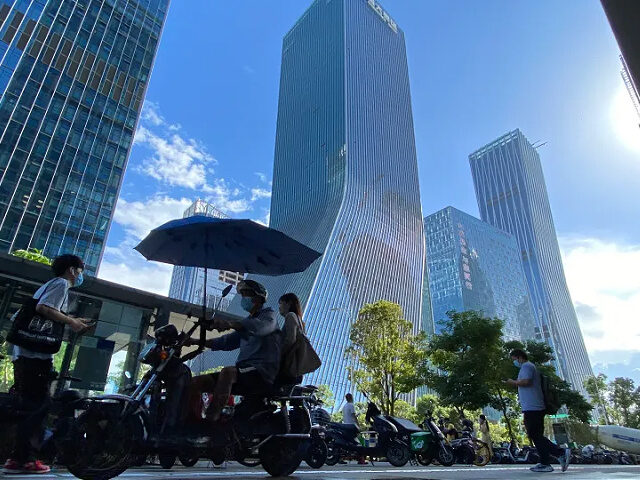China’s Evergrande Group took a horrifying $2 billion plunge in the Hong Kong stock market on Monday morning, losing 80 percent of its share value on the first day of trading after a 17-month suspension.
Trading continued on Monday, to the surprise of some analysts who expected Chinese regulators to suspend the company again because the collapse of Evergrande could bring down the Chinese real estate market, if not the entire national economy.
Evergrande is a titanic real-estate company that racked up over $300 billion in debt after the 1990s property boom ended. None of China’s big real-estate companies are doing terribly well, but Evergrande is so huge — and the structural problems uncovered in a 2021 regulatory crackdown are so severe — that financial analysts around the world have been holding their breath and watching the company totter for years.
The property market represents about a quarter of China’s economy, so if Evergrande goes down and brings the whole sector with it, the result could be a cascading series of bankruptcies and cataclysmic loss of confidence in the Chinese financial system. Adding to the apprehension among global investors is the certain knowledge that if the Chinese property industry collapses, the Communist government will sacrifice private industries to protect state-owned enterprises.
Chinese homebuyers were so angry at the collapse of the property industry, especially when wobbly companies like Evergrande simply stopped working on projects and left individual buyers without a home to move into, that they staged a “mortgage revolt” and refused to make their payments. This made the finances of the property industry even more perilous.
Evergrande filed for bankruptcy protection in U.S. court on August 17, a necessary maneuver since so much of the company’s debt is held by American and European investors. Chinese analysts said bankruptcy was necessary to protect Evergrande’s assets while the company reorganized, but insisted corporate operations would continue normally.
The Hong Kong Stock Exchange suspended trading in Evergrande shares in March 2022, along with several of the company’s biggest subsidiaries. No immediate reason was given for the suspension, but observers noted Evergrande failed to publish its financial results for 2021 and investors were nervous about the real estate giant selling off its assets, so the trading freeze prevented a wave of panic selling.
As things turned out, the wave of panic selling was merely delayed. On Friday, Evergrande announced it had met all of the requirements to resume trading, including the publication of its financial results, which showed about $4.5 billion in losses for the first half of 2023 – a little better than 2022’s numbers, thanks to what the company described as “measures to improve the liquidity position and financial position of the group,” but not enough to reassure investors. Within hours of Evergrande stock returning to the Hong Kong market, shares had lost 80 percent of their value.
Evergrande’s creditors were due to vote Monday on a restructuring plan that would allow them to swap Evergrande Group debt for new bonds and equities. After the dizzying loss of stock value on Monday morning, Evergrande announced the vote will be delayed until September 26 to “maximize creditor engagement and support informed decision-making.”
“Going forward things will continue to be difficult for both its operations and share performance. There’s little hope that Evergrande can rely on selling houses to repay debt because homebuyers would prefer state-owned developers, and it won’t be able to benefit from stimulus policies,” UOB Kay Hian director Steven Leung told Reuters on Monday.
Other analysts told Reuters they did not expect real estate prices to rebound by much in the coming year, if at all, so the value of Evergrande’s assets will not increase by enough to make a difference in its dire financial picture. Evergrande boasted that it took advantage of the “short boom” in China’s economy to goose its income, but that boom is over, and China’s sputtering economy offers little hope that the real estate market will turn around.
Vanguard economist Qian Wang told the BBC that China’s rulers have little choice but to “provide further liquidity and credit support” to Evergrande and other indebted property companies, in order to “prevent financial contagion and limit spillover into the overall financial system.”
To that end, the Chinese government announced on Monday that it will cut its 0.1% tax on stock trading in half, to “invigorate the capital market and boost investor confidence.”

COMMENTS
Please let us know if you're having issues with commenting.